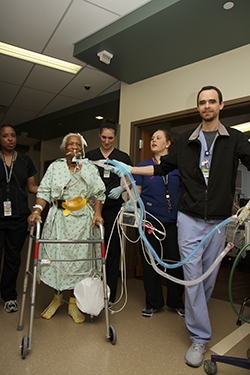Parkland SICU Takes Part in ICU After-Care Initiative
 DALLAS — The Parkland Surgical Intensive Care Unit (SICU) is taking part in a new quality-improvement project called ICU Liberation, in hopes of improving the effects that intensive-care patients face after being released from the hospital. The Parkland SICU is one of 77 intensive-care units chosen by The Society of Critical Care Medicine to take part in the A-F Bundle Improvement Collaborative, an 18-month initiative to improve patient outcomes. The hospital is one of only two Texas ICUs to be chosen.
DALLAS — The Parkland Surgical Intensive Care Unit (SICU) is taking part in a new quality-improvement project called ICU Liberation, in hopes of improving the effects that intensive-care patients face after being released from the hospital. The Parkland SICU is one of 77 intensive-care units chosen by The Society of Critical Care Medicine to take part in the A-F Bundle Improvement Collaborative, an 18-month initiative to improve patient outcomes. The hospital is one of only two Texas ICUs to be chosen.
“This project has the potential to revolutionize ICU care and save lives,” said Brian Williams, MD, assistant professor of surgery in the Division of Burn/Trauma/Critical Care at the University of Texas Southwestern Medical Center, in a statement.
Each year in the U.S., 5.7 million patients are admitted to ICUs for life-saving care, and thanks to advances in critical care, the majority recovers, but nearly half of the patients leave with permanent ailments due to Post-Intensive Care Syndrome (PICS), according to a statement. This can include permanent problems in their physical, mental or psychiatric health.
“Pain, agitation, delirium, immobility and interruption of normal day-night cycles have been considered ‘normal’ for ICU patients…These are not normal or healthy, and we need to eliminate them in ICU settings,” said Williams in a statement.
The irreversible health problems that follow the patients after release include muscle weakness, cognitive or brain dysfunction, memory loss, depression, severe anxiety and even symptoms of Post Traumatic Stress Disorder (PTSD). Every member of the Parkland SICU team, including critical care physicians, nurses, respiratory therapists, physical therapists, occupational and speech therapist, among others are involved in meeting the goals of the A-F Bundle initiative. The initiative focuses on six aspects to try to minimize the effects of a stay in the SICU, as listed below:
A — Assess, prevent and manage pain
B — Both spontaneous Awakening Trials (SAT) and Spontaneous Breathing Trials (SBT)
C — Choice of analgesia and sedation
D — Delirium: assess, prevent and manage
E — Early mobility and exercise
F — Family engagement and empowerment
Focusing on these aspects has already allowed the SICU team to create a positive difference for patients. One change the team has made is getting intubated patients walking in the hallways with the help of a portable ventilator and allowing patients to enjoy the outdoors by focusing on the “E” of the A-F Bundle.
“Mobility is the pinnacle. It’s the most visible change in how ICU patients are managed, so that’s why we’re so focused now on the Early Mobility and Exercise Bundle. Getting more patients up and walking is a huge change from what happens in a typical ICU, and it’s a big culture change for the SICU staff at Parkland,” said Natalie Provenzal, RN, quality improvement manager at Parkland, in a statement.
